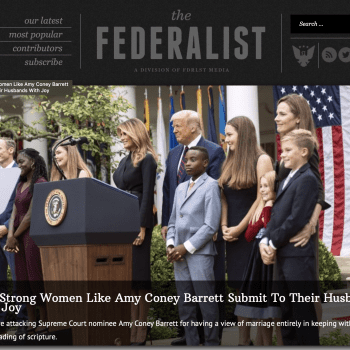Originally posted Time To Live, Friend.
You probably shouldn’t read this book if you have problems with high blood pressure and/or are prone to throwing books across the room. The Botkins advice to readers is a little different:
“Don’t read this book at all…if you have a bad attitude toward your father and if you are trying to keep your distance from him. Many girls enjoy having ‘space’ away from their fathers. That space is dangerous. This book is about protection” (6). And: “If you’re not willing to give your heart to your father, this book will put you at odds with the scriptural mandate you will find here” (6).
Don’t say you haven’t been warned!
Interestingly, I didn’t realize that this book was written when Anna Sofia and Elizabeth were 17 and 15 years old. Since they are so young they freely admit, “We write this book as a candid examination of our times and the issues facing us….” And “We’re not authorities. We’re teenagers” (3).
And yet, let’s face it, Vision Forum certainly isn’t MARKETING it as a “candid” examination! “Within the pages of this book, discover practical, biblical solutions for the young woman who wants to do so much more than just “survive” in a savagely feministic, anti-Christian culture. Find the answers a girl is not likely to get from her church, her peers, or her culture.“ I don’t know about you, but I think they may have left out a small detail about the advice being given by two teenagers.
The Botkin sisters spend the first chapter giving a general introduction to the problems they see with current society and an overview of what they hope to accomplish in this book. In other words, despite the fact that they’re so young, they’re offering advice about what girls older than them should be doing with their lives.
In their youth, the Botkin sister’s parents ministered to college students, and it was in these settings that the Botkin sisters made their first “real friends” outside of their “family circle.” (They didn’t have any friends their own age? Why is this not surprising?) From these college girls, the Botkin sisters observed that many of them came from broken homes and didn’t know what “true love” was.
“What they all seemed to want more than anything else was truth, safety, purpose, and faithful male companionship and protection” (4).
Then the Botkin sisters put on their rose-colored glasses: society was so much better for women in the past, and we need to go back to the patriarchal system of how it was done. Because today girls are spiritually and emotionally abandoned to day cares, and have to learn to fend for themselves, and the evils of feminism, crime rates, promiscuity, abortion, and homosexuality. Because girls don’t submit or have good relationships with their fathers…. Death! Crime! Bad scary things!
The Botkin sisters present around 12 stories to set up their argument that leaving home and pursuing a higher education undoubtedly results in depression, dissatisfaction with life, and/or a sinful lifestyle. They conclude that the problems in these girls’ lives are because they didn’t follow God’s design (staying at home under a father’s protection).
Here are two of the stories:
“Amy was 23 years old and ready to start a life on her own, when suddenly her mother was diagnosed with cancer and died seven months later. Before she died, Amy’s mother asked Amy to take care of her nine younger brothers and sisters, the youngest just a year old. Amy’s struggles in coping with this devastating turn of events, and adjusting to her new role of surrogate mother and lady of the house, have required strength and grace she never could have found in feminist solutions. She also found that she needed her father even more than he needed her” (10).
(I’ll get into the creepy father-daughter vibe later on in this series).
“Fiona was intelligent and had a fiercely independent spirit—the key ingredients to being successful women by our generation’s standards. At age eighteen she left home to pursue higher education and launched herself into a life of independence. She describes it as a life of grief and depression. After five years of unhappiness, becoming increasingly distressed that she didn’t know how God wanted her to use her life, Fiona repented” (11).
While I plan to dissect these beliefs throughout the whole series, I just want to mention that what the girls in the stories fail to take into consideration is the fact that it’s perfectly normal to experience these feelings when you’re first out on your own and trying to simply figure out life. I think most people would describe their 20s as a time of great uncertainty, change, and soul-searching, but also a rewarding time of adventure, new experiences, and self-discovery. Because the Botkin sisters can’t allow for this option (you mean it’s normal to have ups and downs in life and that’s not just because you’re not “under your father’s protection?”) they can only conclude that the girls have started adapting the “ways of the world.”
Or perhaps, in Fiona’s case, it wasn’t because she was independent and pursuing a higher education—maybe she lacked friends and a healthy social life. Maybe she didn’t love what she was learning. Maybe rather than being a sign that she needed to “repent” it was a sign that she needed to change her degree or see a counselor.
The Botkin sisters don’t notice any of these options, however. For them, it all comes down to submission and giving your heart to your father—or else bad scary things will happen to you.















